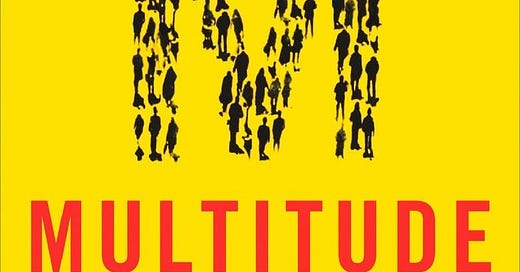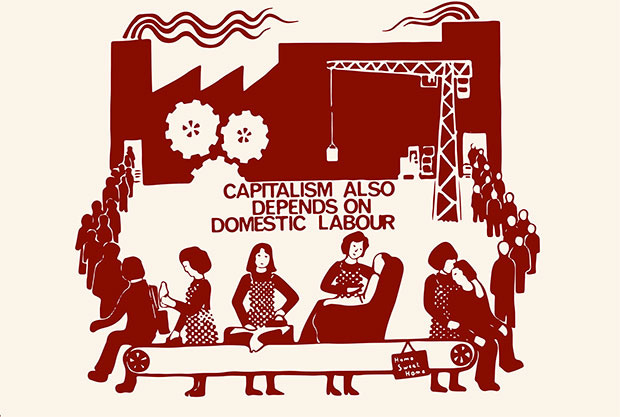Recently, I outlined the importance of theorizing the knowledge economy by focusing on the major shifts in the content of capitalist labor which have driven accumulation during the neoliberal period. It reminded me of a short response paper I wrote during my master’s about Michael Hardt and Antonio Negri’s theorization of “immaterial labor”. Their writings had been criticized ad nauseum long before I was even aware of them, but they are nonetheless important authors in the contemporary Marxian literature. This is because the themes of capitalist transformation and the rise of new forms of labor are often either handwaved away or outright not dealt with. It is always better, in my opinion, to try and fail than to do nothing at all.
For all their flaws, Hardt and Negri attempted to deal with the concrete questions facing communists at the time. Anyways, this short piece complements the other one I posted this week. I have added some elements, but it largely remains as it was when I wrote it in 2022 during my course on labor subjectivities.
Also if you’re interested in supporting my work, I have a discount of 25% for an annual subsription! You’re getting to support my (immaterial) labor for cheap!
Trying to Explain Our New World
Michael Hardt and Antonio Negri in the Multitude: War and Democracy in the Age of Empire develop a new theorization of labor subjectivity in contemporary global capitalism. Central to their argument is that the hegemonic form of labor has changed from “industrial labor,” which categorized the Fordist era, to “immaterial labor” in today’s post-Fordism.1 They define industrial labor as involving primarily the production of “material goods,” whereas immaterial labor is involved in the production of knowledge, information, affect and communication, relationships, emotional responses, and other “immaterial products.”2
There are two forms of immaterial labor, the first is “intellectual or linguistic,” which focuses on “problem solving, symbolic and analytical tasks, and linguistic expressions,” and the second being affective labor, which “produces or manipulates affects such as a feeling of ease, well-being, satisfaction, excitement, or passion.”3 They therefore argue that a multitude of different types of immaterial labors are involved in the larger social reproduction of life. In other words, material labor produces the “means of social life,” whereas immaterial labor produces “not the means of social life but social life itself.”4
The authors argue that this new form of hegemonic immaterial labor requires a new understanding of value in contrast to the traditional Marxist conception, which focuses on the production of surplus-value for capital. In contrast, immaterial labor produces value based on “the common,” which is both material and immaterial, and comprises our collective relations, knowledge, and affects.5 Value is now “biopolitical” in that “living and producing tend to be indistinguishable.”6 This new value comes from a nexus of immaterial labor and biopolitical production that is not only increasingly immeasurable, but also has a tendency to be “common” and “shared.”7 Since immaterial labor reproduces the social relations of life itself, Hardt and Negri argue “all forms of labor are today socially productive, they produce in common, and share too a common potential to resist the domination of capital.” 8
While Hardt and Negri capture the increased obscuring of distinctions between life and work and the growing mystification of our social relations, their theorization of “immaterial” labor presents various empirical, conceptual and analytical weaknesses. First, the characteristics Negri and Hardt associate with immaterial/affective labor have always been a part of various forms of labor, both “material” (goods producing) and “immaterial” (service producing). While I applaud that they attempt to use the term immaterial labor to capture a concrete set of phenomena that are (still decades later) undertheorized, the language mislabels and misleads readers. The division of “material/immateiral” has no place in Marx’s political economy in the first place as all labor is “material”, as are our social relations.9
There’s no doubt that developed nations have moved from producing manufactured goods to various forms of service labor, ranging widely in the sophistication of the latter. However, capitalism has always been a totalizing system, thus always about producing “knowledge, information, affect and communication, relationships, emotional responses” along with “goods”. The degree and intensity of that production has changed. I agree that ‘service’ labor, broadly understood, is now the hegemonic form of labor driving accumulation. But that is a change that has not negated the essential nature of capitalism.
As Sylvia Yanagisako points out, the subjectivity of industrial labor has always involved the application of affect, knowledge, communications, and navigation through inter-personal networks.10 Yanagisako uses the example of her own research on industrial manufacturing in Northern Italy. These networks of small to medium size firms include various relations of affect, kinship, personhood, sentiments, and commitments between laborers that underpin value relations.11 If capitalism is understood as a ‘mode of production’, a determined form of social production, then by definition it has an effect on all elements of our reproduction.
Ultimately, while Hardt and Negri attempt to develop a new subjectivity of labor, it fails not only due to these empirical inaccuracies, but also as a revolutionary subjectivity that works to moblize the masses against capitalism. Rather than challenging the binaries of productive vs. unproductive, mental vs. manual, industrial vs. immaterial, which are constructs of value, they simply turn the binary around in the favor of immaterial labor. At its worst, this awkwardly reproduces some of the productivist narratives that value certain forms of labor over others based on their supposed productivity of value.
A more fruitful conceptualization would be to first frame capitalism as a concrete mode of social production. Then from there, we can ask what are the necessary forms of labor required for its reproduction? Here we don’t simply mean wage-labor, but rather, productive activity in general (the most general understanding of labor). This forces us to ask about all the ways (political, ideological, economic, gendered, racial) that capitalism reproduces itself. It also forces us to understand that all labor, directly or indirectly, contributes to the valorization of capital by upholding a myriad of social relations, something which Social Reproduction Theory emphasizes heavily.12 All labor contributes to reproducing society, because social relations of production are greater than the conceptual confines of value.13
As Federici points out, just because value cannot “capture” all the products of labor (material or “immaterial”) does not in fact mean that labor is not subsumed under the traditional value logic.14 It is precisely this inability to capture all the products of labor that is characteristic of value itself, and moreover, capitalist as an increasingly regressive social system. The problem is not the need to rework the theorization of value. Rather, we must build on the foundations of Marx’s critique of political economy to develop political projects outlining a liberating labor subjectivity for the masses to strive for and overcome the logic of value.
Works Cited
Best, Beverley. The Automatic Fetish: The Law of Value in Marx’s Capital. London ; New York: Verso, 2024.
Bhattacharya, Tithi. “How Not To Skip Class: Social Reproduction of Labor and the Global Working Class.” Viewpoint Magazine, October 31, 2015. https://viewpointmag.com/2015/10/31/how-not-to-skip-class-social-reproduction-of-labor-and-the-global-working-class/.
Federici, Silvia. “On Affective Labor.” In Cognitive Capitalism, Education, and Digital Labor, edited by Michael Peters and Ergin Bulut. New York: Peter Lang, 2011.
Hardt, Michael, and Antonio Negri. Multitude: War and Democracy in the Age of Empire. New York: The Penguin Press, 2004.
Yanagisako, Sylvia. “Immaterial and Industrial Labor.” Focaal 2012, no. 64 (December 1, 2012): 16–23. https://doi.org/10.3167/fcl.2012.640102.
Yanagisako, “Immaterial and Industrial Labor,” 16.
Hardt and Negri, Multitude, 108.
Hardt and Negri, 108.
Hardt and Negri, 146.
Hardt and Negri, 148.
Hardt and Negri, 148.
Hardt and Negri, 148.
Hardt and Negri, 106.
While she does not mention the authors in question, Berverly Best reiterates the lack of analytical use for the terms in her discussion of Marx. “Automatic Fetish” 16.
Yanagisako, “Immaterial and Industrial Labor,” 19.
Yanagisako, 20.
Bhattacharya outlines a very inclusive definition of the proleteriat that I believe retains many of the strengths of Hardt and Negri's conceptualizations with more theoretical consistency Bhattacharya, “How Not To Skip Class.”
Hardt and Negri, Multitude, 149.
Federici, “On Affective Labor,” 70.






It confounds me why the notion of services or immaterial labour is treated as such a big problem for marxism when the second paragraph of Capital describes a commodity as
„an object outside us, a thing that by its properties satisfies human wants of some sort or another. The nature of such wants, whether, for instance, they spring from the stomach or from fancy, makes no difference. Neither are we here concerned to know how the object satisfies these wants, whether directly as means of subsistence, or indirectly as means of production.”